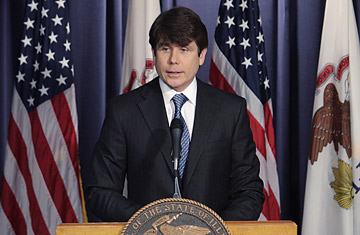
Illinois Governor Rod Blagojevich addresses reporters during a news conference at the State of Illinois Building in Chicago, Friday, December 19, 2008.
Defiant or recklessly stubborn, Illinois Governor Rod Blagojevich on Friday vowed that he would not resign or temporarily step aside, saying he owed it to the voters of the state to remain in office despite polls showing some 80% want him out. "I will fight, I will fight, I will fight until I take my last breath," Blagojevich said to a packed news conference in Chicago's Loop. It was the first formal statement Blagojevich had made since being charged last week with trying to auction off President-Elect Barack Obama's Senate seat, among other alleged offenses.
"I am innocent," he proclaimed. "I am not going to quit a job the people hired me to do." simply because nearly every politician in the state and many nationwide, up through the President-elect, have called for him to step aside. He called the charges against him, "false accusations," and declared those seeking to remove him from office were "a political lynch mob." (See the Top 10 Scandals of 2008.)
With state and U.S. flags behind him, Blagojevich appeared at the podium alone, rarely looking down as he addressed the media and spoke into the cameras, including a dramatic recitation of lines from a Rudyard Kipling poem: "If you can keep your head when all about you are losing theirs and blaming it on you, if you can trust yourself when all men doubt you and make allowance for their doubting too, if you can wait and not be tired by waiting or being lied about, don't deal in lies, or being hated, don't give way to hating." He left unsaid the poem's conclusion: "... then you'll be a man, my son."
He did not take questions, but minutes later two of his attorneys came out to take some from reporters. One of them, Sam Adam, Jr., reiterated the governor's intention to remain in office, but allowed that Blagojevich could step aside if the pressures of defending himself against U.S. Attorney Patrick Fitzgerald's charges became too heavy for him to complete his work. "If the people of Illinois suffer, he will step aside," said Adam.
Yet it was Blagojevich's brief but defiant appearance that dominated the afternoon in Chicago. In its combativenss, it called to mind — especially to some who know the governor intimately — one of his political heroes, another besieged politician who overstayed his welcome on the national stage: Richard Nixon.
While going to school at Northwestern University, Blagojevich idolized Nixon, according to friends, frequently defending him during the Watergate scandal. According to a long-time Blagojevich friend, the future governor often found inspiration in Nixon's "me against the world" sensibility. Blagojevich particularly loved the fact that Nixon bounced back after the "you won't have Dick Nixon to kick around anymore" speech after losing the race for California governor in 1962.
Blagojevich dismissed Nixon's corruption as par for the political course, asserting (like many Nixon defenders) that the Kennedys did far worse things than anything that happened in Watergate. He admired Nixon for his great ambitions and for his efforts to do big things in office such as the rapproachment with China. As for Watergate, Blagojevich used to say that had the President just burned the tapes, it would have been a footnote in history.
Blagojevich also identified with Nixon's own self-image as a political outsider. Indeed, the young Blagojevich was something of a loner in college, keeping to himself as he traveled daily from his home in Chicago to the Northwestern campus in nearby Evanston. The future governor, says his old friend, was always "aware that he was a bit different from most of the kids on campus, and sort of proud of it. There was without questions an 'I'll show them' edge to him." Several acquaintances and people who graduated the same year as he did were even surprised to find out later that they'd been in the same class. Lance Pressl, who graduated from Northwestern in 1979 in political science, said he didn't know Blagojevich was a classmate until 2000, when Pressl was running for a Congressional seat, and Blagojevich (then a Congressman in a nearby district) campaigned with him.
Another familiar aspect of Blagojevich's performance on Friday was his penchant for quoting long passages of favorite writings from memory. Along with Kipling, another of his favorites was Teddy Roosevelt's "man in the arena" declaration, delivered in the Sorbonne in Paris in 1910. Its key passage: "It is not the critic who counts; not the man who points out how the strong man stumbles, or where the doer of deeds could have done them better. The credit belongs to the man who is actually in the arena, whose face is marred by dust and sweat and blood; who strives valiantly; who errs, who comes short again and again, because there is no effort without error and shortcoming; but who does actually strive to do the deeds...."
"Believe me," says the governor's friend, "Rod is repeating that speech to himself these days." With reporting by Ryan Blitstein/Chicago
